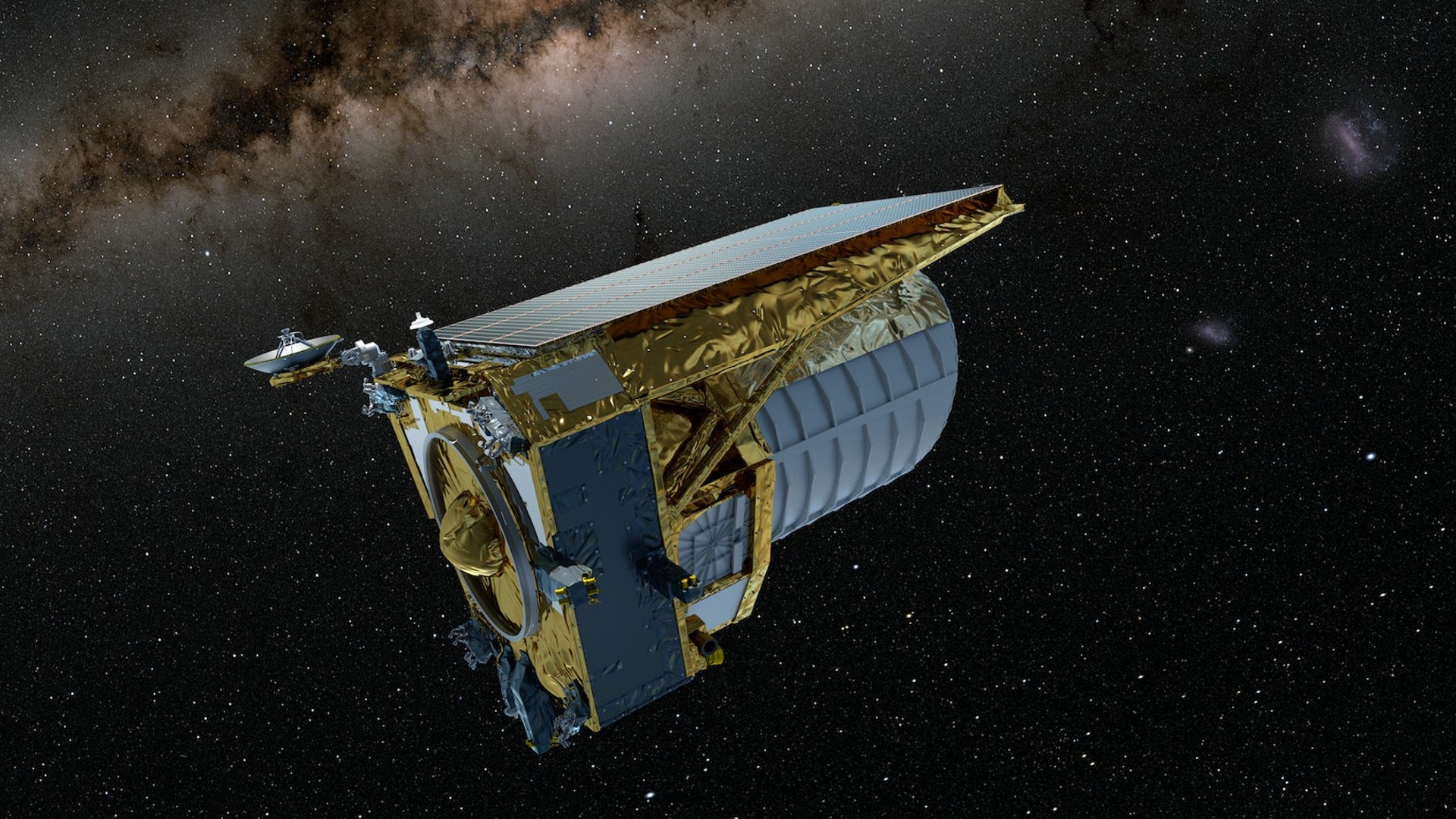
Update for 12:15 pm ET: SpaceX has successfully launched the Euclid space telescope into orbit and deployed the dark matter hunting observatory to end the launch phase. The space observatory is now headed toward its final destination 1 million miles from Earth at Lagrange point 2. You can see launch video and photos and our wrap story here.
CAPE CANAVERAL, FLORIDA — Europe's dark universe hunter is ready to leave its home planet.
Euclid, a dark matter and dark energy mission, is set to launch from Cape Canaveral Space Force Station here tomorrow (July 1) aboard a SpaceX Falcon 9 rocket. Launch is scheduled for July 1 at 11:11 a.m. EDT (1511 GMT). A live webcast from NASA Television will be carried here at Space.com for free starting at 10:30 a.m. EDT (1430 GMT).
After liftoff, Euclid will spend about a month journeying to the distant Sun-Earth Lagrange Point 2, on the opposite side of the sun to us and about 1 million miles (1.5 million kilometers) from Earth. After another seven months of commissioning, the probe will spend six years studying the dark universe, gathering data that will shed light on the evolution of galaxies, the expansion of the universe and other physical phenomena.
"This is 15 years of people's lives," Carole Mundell, the European Space Agency's (ESA) director of science, said during a prelaunch briefing on June 23. "There were two teams that originally proposed missions, one to study dark energy and one to study dark matter. Both were incredibly challenging, but we thought, 'Well, that's not hard enough. Let's put them both together on a single spacecraft and do the impossible.' "
Related: James Webb Space Telescope will help Euclid spacecraft investigate dark energy and dark matter
Dark matter is believed to make up most of the material universe, but we can only see it through its gravitational effects. Dark energy is the force believed to be pushing along the accelerating expansion of the universe. Euclid aims to bring sharper eyes to the sky than ever before to try to demystify dark matter and dark energy.
As Mundell noted, the 1.4 billion-euro ($1.5 billion USD) Euclid was originally split among two mission concepts proposed to ESA in 2007: Dune (Dark Universe Explorer) and Space (Spectroscopic All Sky Cosmic Explorer). Euclid, selected in 2011, forges the complementary studies of these proposals to examine dark matter and dark energy across time and space.
Euclid will include two complementary experiments. The first examines lensing — the "precise detail, the shapes of galaxies ... that goes back to 10 billion light-years," said Gaitee Hussain, head of ESA's science division, during the same briefing. The second study will scrutinize the redshifting of galaxies, or the light of receding galaxies being stretched into the red parts of the wavelength spectrum.
The images by Euclid will be four times sharper than equivalent ground surveys looking at large swaths of the sky, Hussain added. "That also requires really working hard on the technology to get the most out of the instrumentation we possibly can," Hussain said.
Euclid will carry out this work using two instruments. One will focus on visible light, whereas the other is optimized for infrared (heat) wavelengths.
Euclid is also complementary to other missions with ESA involvement that look at cosmic time, such as Europe's Gaia, which tracks the location of more than a billion objects in space, and the NASA-led James Webb Space Telescope, which is peering at some of the universe's first-ever stars and galaxies, among other tasks.
The forecast for launch on Saturday appears excellent. For the early morning before 8 a.m. local (the longest-range data available in the 24-hour forecast), Cape Canaveral Space Force Station will have clear skies and no chance of rain or lightning, with light winds of just five knots, according to the forecast from the U.S. Space Force's Space Launch Delta 45.
Elizabeth Howell is in Florida to cover Euclid's launch under co-sponsorship by Canadian Geographic magazine and Canada's University of Waterloo. Space.com has independent control of its news coverage.







